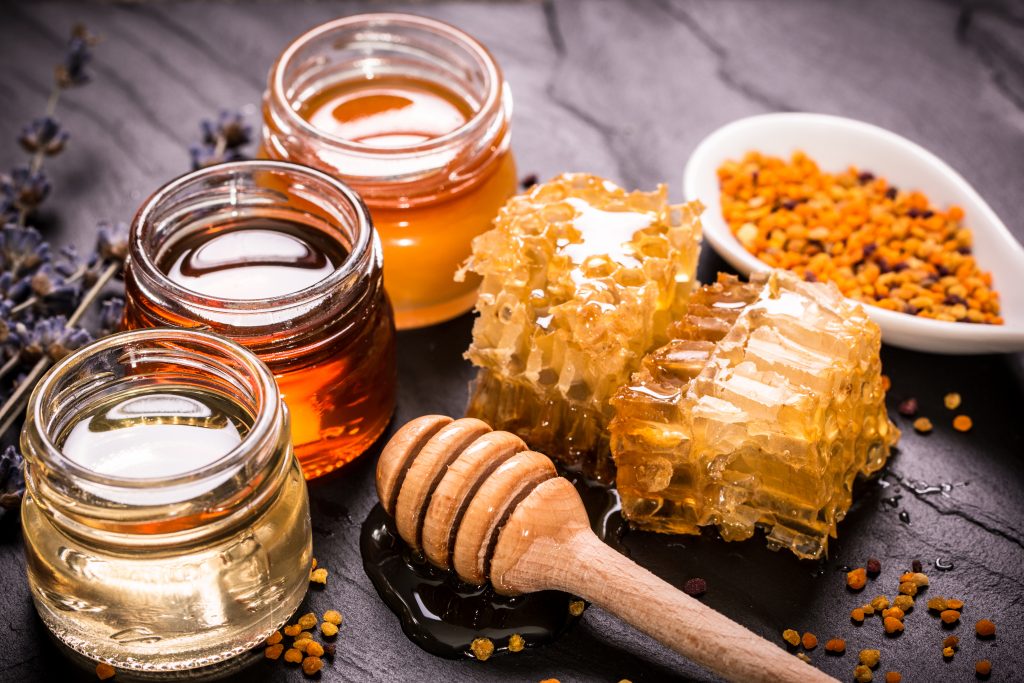Everyone is familiar with honey, but what do you really know about this sweet, sticky substance?
Honey comes from bees; that much is obvious. But how (and why) exactly do bees put time into creating this nutritious, delicious food? There’s a lot to learn about honey and the many different types of honey that you can enjoy.
Honey sticks are one of the easiest ways to try honey, and we’ve launched our own honey sticks (packed with kratom, of course) that you can order today. Let’s learn more about this sweetener so you can get a taste of what our honey sticks are made of.
All About Honey
What is honey?
Honey is a sweet food that is usually found as a thick liquid. Honey bees make honey by gathering nectar from flowers and other plants. After pollination, the nectar gathered goes through a process inside the beehive before it is stored as a future resource by the bees.
The natural variation in plants causes the variation found in honey. The nectars produced by plants have varying sugar, mineral, and organic compound contents. The honey created by a bee’s hives is very dependent on what type of nectar is gathered.
Why Honey is Made
Why exactly do bees make honey? Do they make it just for humans like us to enjoy?
Of course not!
Honey bees gather nectar to create honey as a food source to help the hive’s health and ability to survive difficult seasons like winter. The daily food source of bees in favorable seasons is actually pollen from the same plants they gather nectar from.
Pollen is an immediate food source for honey bees and even helps them grow a larger brood. The bees have pollen baskets on their legs which help with pollen collection; nectar is added to the pollen to help compact it for easier transport.
When nectar is brought back to the hive, honey bees add enzymes which cause a shift in the nectar’s chemical composition. As dehydration occurs, the water content reduces, and honey forms.
Different Colors of Honey

If you’ve ever bought honey at the grocery store or a farmer’s market, you’ve probably noticed that the color of honey can vary. In fact, there are seven official color categories used by the U.S. Department of Agriculture to classify honey.
These seven categories are:
- • Water white
- • Extra white
- • White
- • Extra light amber
- • Light amber
- • Amber
- • Dark amber
“White” honey may seem confusing as there isn’t any honey that is truly white in color. Rather, this designation means that the honey is transparent or very near so.
What exactly do these designations mean, and why are there different honey colors at all?
The color of honey is inconsistent because the pollens and nectars collected by bees vary. Different plants lead to different colored kinds of honey, and one hive can even produce varying colors of honey depending on the season or crop availability in the area.
If you want to get more technical about it, the variation of color can be somewhat attributed to the mineral content of the flower source. Magnesium, sodium, copper, iron, calcium, potassium, surfer, and manganese can all influence the color of honey.
Flavors of Honey
Do the flavors of honey vary alongside its color?
Yes, it can vary. Often, the two vary in similar and expected ways once you learn that lighter honey is more mild and darker kinds of honey have richer, stronger flavors. Of course, there are always going to be some exceptions to this rule. For instance, bees that collect pollen and nectar from tulips create deep-colored honey that has a very mild taste.
Some types of honey are more popular (and common) than others. These are some types of honey you likely come across while shopping:
- • Blueberry honey: light amber honey with a rounded, full flavor.
- • Clover honey: among the most popular in the US; mild tasting
- • Wildflower honey: used for varieties made from miscellaneous or undefined plants
Honey Changes Color
Did you know that honey can change color over time?
No matter what color honey is initially, it is likely that the color will darken over time or when heated. This is natural and normal, but it can confuse your understanding of whether these actions always cause variation in honey’s color. However, we’ve already shown how honey simply comes in many color and flavor varieties!
Just Launched: Phytoextractum’s Honey Sticks
You might wonder why we’re excited to share so much about honey in this blog post, and that’s because we’re excited!
Here at Phytoextractum, we’ve just launched a new product that we know our kratom fans might love: Kratom Honey Sticks.
Kratom honey sticks are a simple, easy way to enjoy kratom. Each stick contains 25mg of mitragynine, and the packaging is as convenient as one might expect from honey sticks. We’ve made sure to introduce a product that might surprise you in both its usefulness and uniqueness.
Enjoying Our Honey Sticks
Our customers have shared that it’s easy to enjoy these honey sticks. The sticks simplify kratom for many and can be eaten directly. Mixing the sticks into your favorite drink or even your kratom tea is also easy – the possibilities are only limited by your imagination. Consider how you like using honey or sweetener and see if kratom honey sticks would work in those applications.
High-quality Service, High-quality Products
As always, we want to remind our customers how important it is to ensure they purchase their kratom and kratom-related products from high-quality vendors. Contamination is a serious risk, and you want to be sure to purchase from vendors with your safety in mind.
We were one of the first American Kratom Association members to qualify for Good Manufacturing Practices certification. We test all products for accurate identification, alkaloid content, heavy metals, and microbial safety. If you have questions about our testing processes, contact us at any time. Every good vendor should be ready and willing to answer these questions; we know we are!


